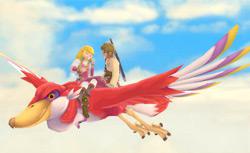I have a soft spot for games that try to address what it means to be human in a difficult world. We already have a highly evolved interactive language for shooting things—we’ve been working on that since Spacewar! Designers are now trying to figure out how to communicate more complex interactions, and it’s a tough nut to crack. Games that attempt to chart such a course are likely to fall short in some ways, but they can still be appreciated as beacons for other daring designers willing to take up the cause.
Krystian Majewski’s Trauma is such a beacon. This game plunges you into the subconscious of a young woman who has survived a car accident. The player navigates 3-D photographs that explore her dreams, fears, and memories. A malleable narrative emerges, and the player constructs meaning by assembling and carefully examining the photographs. Trauma contains puzzle elements, but they feel like an afterthought. So the obvious question: Is Trauma even a game? I don’t know, nor do I much care. Trauma tries to explore a different space, as do other such games that emerged this year. Ian Bogost’s A Slow Year is about cultivating awareness. One Man Down’s Solace uses bullet-hell mechanics to depict the five stages of grief. These are the kinds of next-gen interactive experiences (apologies for that awful moniker) I saw at festivals like IndieCade and the IGF in 2011, and I find them tremendously encouraging.
So, back to Chris’ prompt. I say the best game of 2011 was Dark Souls. I’ve already mentioned why I think so, and Tom did a terrific job of articulating how and why the game hooked him. I’ll just make one more point about this remarkable game, borrowing from reflections I first explored on my blog.
Dark Souls is an exacting master. No game requires more persistent mindfulness of my actions, my environment, and my technique. Each new region (and its terrain and inhabitants) will test what I’ve learned. Every time I enter a new place for the first time, I unfailingly pause to take a breath and consider my preparation. Am I ready for this? Do I have everything I need? Am I nimble enough? Am I strong enough? Am I fully focused and undistracted?
If any of these answers are no, I will very likely die. If all the answers are yes, I may survive, but probably not. The real challenge for me isn’t survival. The game starts the player as dead and insists on keeping him there. The challenge is mostly about paying attention. Learning the game’s cues, memorizing its environments, and internalizing its systems. Dark Souls doesn’t rely on adaptive AI for its nonplayer characters because doing so would disrupt this carefully balanced ecosystem. It would also likely make me shoot myself in the head.
As for my favorite game of 2011, I have to go with The Legend of Zelda: Skyward Sword. It’s an admittedly personal choice, but I’ve enjoyed a long love affair with the Zelda games, and Skyward Sword embraces all the best things about the series while eliminating many of the niggling annoyances. The Wii MotionPlus swordplay is smooth, responsive, and crazy fun. The enemies and dungeons feel at once fresh and familiar, and the game goes out of its way to offer a helping hand to new players, adding fast travel via Loftwings, a sensible new save system (finally!), a “dowsing” tool for pathfinding, and Sheikah Stones for gameplay hints. Eiji Aonuma and team have delivered a modern, beautiful Zelda game that remains faithful to its heritage. I appreciate Zelda games as “ritual narratives”—tales that are retold and subtly remolded, but that are essentially the same hero journey respun with each iteration. And I’m fine with that.
The most important game of 2011 was Angry Birds. Sorry. I know it’s two years old. I know it’s the butt of jokes among “serious” gamers. Here’s what I also know. Angry Birds was the top-selling iOS app and the most downloaded Android app of 2011 by a wide margin. Two special editions, Rio and Seasons, both made the top-10 best-selling list too (despite Seasons being out for only two months). The game has been downloaded more than 500 million times across all platforms. Impressive numbers … but forget them. Here’s another thing I know: My 4-year-old daughter went trick-or-treating this Halloween, and practically every other candy-seeking tyke in the neighborhood was dressed as an Angry Bird. There’s one more thing I know: Mobile games ate the industry’s lunch this year, and Rovio’s little pig-smasher is the face of that phenomenon. I hope Nintendo president Satoru Iwata has a plan B.
Finally, the most disappointing game for me, and this will get me into a heap of trouble, is Portal 2. Mind you, I’m not saying Portal 2 is a bad game. Not at all. I’m saying I found it disappointing, especially as a sequel to one of the best video games ever made. Portal 2 felt burdened by new mechanics—I had more toys to play with, but none of them added to my experience. Hard light surfaces, excursion funnels, conversion gel, repulsion gel, propulsion gel, redirection cubes—they all seemed like ideas dreamed up to add variety for the player rather than logical extensions of the game world. Likewise, the travelogue through Cave Johnson’s career as a mad industrialist felt like narrative padding to me. I simply didn’t care about him, so exploring his relics gave me more to do but no compelling reason to do it. The script and acting are terrific, and I agree with Tom that Stephen Merchant’s performance as Wheatley is fabulous. It’s a smart, expertly crafted game, but compared to the original I found it disappointing.
I’ve enjoyed this conversation immensely, gentlemen. Thanks for including me. I hope we can do it again next year!
